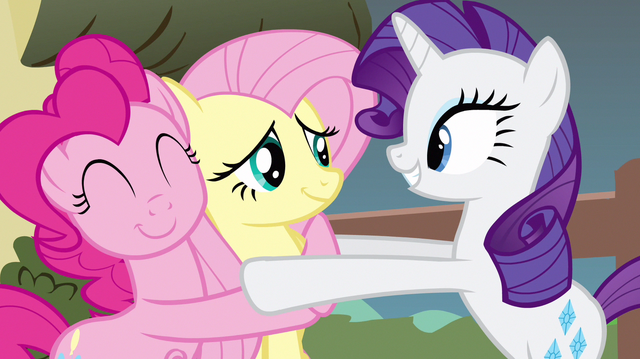Friendship Report: Aristotle
and Aquinas on Friendliness or Amiability
Well, I did like this episode.
It’s a bit fun to see Fluttershy acting out of character. However, what I find
more interesting is that “Putting Your Hoof Down” is a kind of a moral lesson
on the virtue of friendliness or amiability, as identified by the two prominent
virtue ethicists Aristotle and St. Thomas Aquinas.
 |
| Aristotle, Aquinas, and some guy named Plato |
Before I get to the specific virtue,
allow me some words on virtues in general. The Catechism of the Catholic Church tells us that:
1804 Human virtues are firm attitudes, stable dispositions, habitual
perfections of intellect and will that govern our actions, order our passions,
and guide our conduct according to reason and faith. They make possible ease,
self-mastery, and joy in leading a morally good life. The virtuous man is he
who freely practices the good.
The moral virtues are acquired by human effort. They are the fruit and
seed of morally good acts; they dispose all the powers of the human being for
communion with divine love.
Summarized roughly, the virtues
are dispositions towards doing the good, for morally right actions. A disposition
(or habitus in Latin) is a firmness
or stability in doing something, as opposed to random behavior – “A virtue is a
habitus that is always for good” as Aquinas says (ST 2-1.55.4). Therefore, somepony
who exemplifies the virtue of honesty, like Applejack, is disposed towards
telling the truth, instead of just sporadic truthfulness some of the time. (We
can get into the further issue of the consistency of AJ’s honesty in the series
but that’s another post for another day, not to mention it'll lead us back to that whole debate on the Catholic blogosphere a year ago on the definition of lying and whether lying is always wrong, which I think is the case.)
 |
| AJ, be honest, have you told any lies lately? |
As virtues dispose us towards the
good, their opposites, vices, dispose us towards the bad. More specifically,
while virtues perfect our powers of the soul (the rational soul in us humans),
as Aquinas notes (ST 2-1.55.4), vices work against the perfection of our
powers.
Cultivating virtues is then just
like learning to ride a bike, you practice and practice until the action
becomes easy to do, or second nature.
Two further points, though. First,
it is important that the Latin term habitus
used by Aquinas translates as “disposition” rather than “habit,” as a
disposition, while firm once acquired, is still voluntary, that is, we freely
chose to exercise the action. Second, both Aristotle and Aquinas see the good
as the fulfilling of the end of something (my buddy DGD mentions “final causality”
in connection to MLP-related matters here). In the case of humans, rational
animals in Aristotle’s definition, the good for us is the perfection or fulfilling
of our rational nature; the virtues help us in the journey towards this end, which is happiness, be it intellectual contemplation in the case of Aristotle or the beatific vision for Aquinas.
Virtue theory usually divides the
virtues into the intellectual, moral, and theological, the first two
(potentially) acquirable by human effort and the third only attainable by God’s
grace (though for the Catholic all virtues require God’s help in some sense).
However, for the purposes of this post, we focus only on the moral virtues (or “cardinal
virtues”). The cardinal virtues divide into prudence, justice, fortitude, and
temperance. Prudence guides the other virtues and is a kind of moral common
sense that allows us to discern the right goods to purse along with the right
means. Justice is concerned with giving what is due (to both other men and God).
Fortitude is firmness in pursuit of the good. Temperance is a balance in
sensual pleasures, like food, drink and sex.
Since the virtue of justice
concerns giving what is due to our neighbor, and since humans are social
animals as Aristotle points out, it is of great importance what sort of
relationship we have with others in society (and with God). We owe a debt of honor of truthfulness in our words (honesty) and actions (friendliness), without which society could not survive (ST, 2-2.114.2). As Julie Davis of Happy Catholic blog reminds us, it all
boils down to following the commandant of Christ to love, to “Do to others
whatever you would have them do to you” (Matthew 7:12). The just man, then,
lives in harmony with his fellow man, which brings us back to friendliness, a
satellite virtue of justice…
Fluttershy the Element of Amiability
Among the moral virtues
considered by Aristotle is one to which he gives no name that deals with our
relations with other people, but can be called by us friendliness or amiability.
First, Aristotle considers two extremes or vices related to friendliness - obsequiousness
and disagreeableness:
Some men seem to be obsequious in association with others and in
interchange of words and deeds. They praise everything for the sake of
pleasantness, and never contradict anyone, being of the opinion that
unpleasantness ought to be avoided.
Others, on the contrary, always find fault, taking care to emphasize
anything unpleasant. They are called perverse and quarrelsome. (NE, IV, 816-817)
In other words, obsequiousness is
being a “doormat” or “pushover” with others, being overly eager to please and
not cause offense, especially in matters in which disagreement is necessary. While
with her general agreeable disposition Fluttershy is always in danger of this
vice, in “Putting your Hoof Down” she definitely slides over in obsequiousness.
At the start of the episode, when her dealings with other ponies call for her
to point out an injustice, she instead backs down, not wanting to displease
anypony.
On the other hoof, the opposite
vice of disagreeability doesn’t give a flying feather what others think, be it causing
offense, criticizing, and arguing at every opportunity. Therefore, the new
Fluttershy, fresh off her assertiveness training, is nasty towards the other
residents of Ponyville, even her own friends, harshly criticizing any mistakes,
flaws, or quirks that cross her path, regardless of what pain it may cause or of
the necessity.
Aristotle next tells us the mean
between the two extremes:
These habits being reprehensible, obviously the mean habit is
laudable—that habit according to which a person approves what he should and
also disapproves what he should. (NE, IV, 818)
Amiability or friendliness boils
down to being agreeable with others when necessary and disagreeable when necessary.
Aristotle further elaborates that the amiable man “aims to cause no offense and
to give pleasure” but “will refuse to give pleasure and will choose to cause
pain over what is dishonorable and harmful to himself or to the person doing an
injury or a great wrong” (NE, IV, 825). In other words, the friendly or amiable will usually
be pleasant around others and seek their good unless an injustice or an evil
performed by others calls him out to cause pain in the form of criticism or correction.
By the end of the episode, Fluttershy
returns to this mean (the old Fluttershy), no longer being a pushover who is
okay with everything or a “Flutterbitch” who fights everypony over every little
thing. As Rarity points out, “You can stand up for yourself without being
unpleasant about it,” which is the Element of Generosity’s way of saying that we
should be agreeable to others. But what is being agreeable to others other than
friendship or a sign of friendship? For friends seek and will the good of one another, and, thus,
sometimes it is necessary for a friend to cause another friend pain in the form
of disagreement or criticism if that friend should falter in the pursuit of the
good, but this is done out of amor amicitiae, the love that is friendship.
Or as Fluttershy tells us in her “Friendship
Report” letter to Celestia:
Sometimes it can be hard for a shy pony like me to stand up for myself,
and when I first tried it, I didn't like the pony I became. But I've learned
that standing up for yourself isn't the same as changing who you are. Now I
know how to put my hoof down without being unpleasant, or mean.
Other sources worth noting:
Brian Davies, The Thought of Thomas Aquinas
Peter Kreeft, Back to Virtue




No comments:
Post a Comment